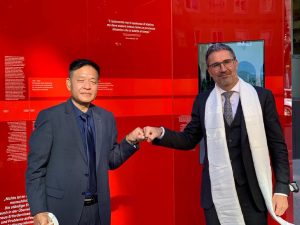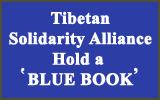Sikyong Meets President Arno Kompatscher of South Tyrol, and Roberto Stanchina, Vice Mayor of Trentino
 Sikyong Penpa Tsering with Dr Arno Kompatscher, President of South Tyrol, 28 October 2021.
Sikyong Penpa Tsering with Dr Arno Kompatscher, President of South Tyrol, 28 October 2021.
Sikyong Penpa Tsering of the Central Tibetan Administration met with Dr Arno Kompatscher, President of South Tyrol, on Thursday, 28 October at Bolzano. Sikyong was accompanied by DIIR Secretary Karma Choeying and Representative Chhimey Rigzin of OOT Geneva, during the meeting.
In his interaction with Dr Arno Kompatscher, Sikyong spoke about the evolution of exile Tibetan democracy. He said that beginning from the 1960s since the early days of Tibetan exile, His Holiness the Dalai Lama has initiated steps to democratise the Tibetan polity culminating in the complete devolution of his full political authority to an elected leadership in 2011. Describing Tibetan democracy as both unique and peculiar, Sikyong said Tibetan democracy is the only ‘party-less democracy’ in the world in addition to the absence of territory to govern. He also briefly apprised the president about recent developments in the Tibetan community such as the now-resolved parliamentary stalemate and the tussle between the Tibetan parliament and the Tibetan Supreme Justice Commission.
Sikyong also explained the objectives of the Central Tibetan Administration, the functions of the three pillars of Tibetan democracy and the autonomous bodies of the administration such as the Office of the Auditor General, Public Service Commission, and the Election Commission.
Responding to questions about the situation inside Tibet, Sikyong said the situation inside Tibet continue to remain grim with over 155 self immolation protests, although he admitted that the situation in East Turkestan and Hong Kong seem to have taken precedence over Tibet lately. He also talked briefly about the policies practiced by the Chinese government to annihilate Tibetan culture and language, and the developments within China such as the internal power struggles between Chinese leaders.
Dr Arno Kompatscher spoke about the unique autonomous status of South Tyrol as a distinct German-speaking region within Italy. He underlined the similarities between the status of South Tyrol and the genuine autonomy sought by the Central Tibetan Administration for the Tibetan people.
At Trentino city, Sikyong was welcomed by Robert Pinter, former councillor of Trentino, and members of Tibet support group and the Tibetan community. It was followed by a meeting with Robert Stanchina, Vice Mayor of Trentino.
In his interaction with Roberto Stanchina, Vice Mayor of Trentino, Sikyong spoke about the oneness of humanity and the need for humans to come together. He said that all human beings are the same despite differences of colour, height, and shape, and there is no conflict that cannot be resolved peacefully through dialogue.
Sikyong explained that China despite being a large country, it still occupied Tibet, Mongolia and East Turkestan. China still wants more, that’s why, it is trying to occupy more territories in the South China Sea and is also challenging India at the borders, he added.
Sikyong further noted that China talks about a harmonious society but there is a disconnect between what China says and what it practices. He says China should acknowledge that its current powerful status is a result of global cooperation and support. “China couldn’t have achieved its current status without international support. However, China is still antagonising its allies and partners,” he said.
Speaking about a just government, Sikyong explained that a government is supposed to look after the welfare of the people that it governs. He highlighted the contrast in governance between China and South Tyrol, and said: “Suppressing the masses by a few in power is not right. This taints the image of the entire country. South Tyrol is a perfect example of a harmonious society where there is mutual appreciation between the people and the government.”
Sikyong underlined China’s deep distrust of its own citizens and the lack of freedom inside Tibet as a result of China’s brutal and unjust policies. “China spends more on domestic security than on external security. It shows that the Chinese government doesn’t trust its own citizens. Humans, unlike animals, are born with a certain set of rights and liberties. However, in Tibet, there is no freedom of religion, no right to one’s own language and culture, etc.,” he told the mayor.




